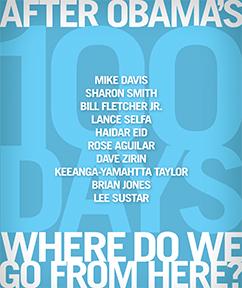Plutocrats 1, Workers 0
Millions of people looked forward to Barack Obama's presidency with a sense of pride and hope. But Obama's first 100 days have raised critical questions about the limits of what we can expect from a Democrat in the White House--and what it will take to get the change we want.
What do you think of Obama's 100 days? And what does the left need to do now to move the struggle forward? We asked a group of writers and activists for their answers to these questions. This commentary is from , a veteran socialist activist and author of many books, including Planet of Slums, In Praise of Barbarians and City of Quartz.
IT'S TIME to put hope back in the dream chest and take out class anger. Having won the helm in the midst of a hurricane, Obama is resolutely steering the ship of state on the same catastrophic course as his predecessor. A turn toward the left may be a real trend in the electorate, but it is illusory or worse at the level of the empire and macro-economy.
True to his campaign promise, the new president is expanding NATO's dirty war in Afghanistan across the Khyber Pass, with the clear risk of igniting a civil conflict of incalculable destructiveness inside Pakistan that could ultimately provoke a nuclear confrontation with India.
By any sober standard, this is a dramatic recapitalization of Bush-era adventurism, not its incremental liquidation, as some former antiwar activists seem to believe. As we all know, the neo-Kissingerian "realism" that Obama's victory has restored to power in the State Department and the Pentagon is the same power politics that bombed Hanoi and Belgrade.
The new administration, moreover, has ratified and consolidated last autumn's coup d'etat inside the Treasury and the Federal Reserve. As non-radical columnists in the financial press have repeatedly emphasized, this is not only the largest transfer of wealth (from the people to bank bondholders) in American history, but also the most staggering theft of the state power by an economic interest group. Summers, Bernanke, Geithner, Furman, Rattner...what are they, if not the long-caricatured "executive committee of the bourgeoisie"?
Certainly the so-called stimulus bill contains some urgent and humane relief, but it is too meager to arrest the collapse of local and state budgets, much less restart the world economy. Moreover, the mega-bailouts will eventually suck all the Keynesian oxygen out of the atmosphere and asphyxiate federal spending on human needs.
Not merely is Obama, like Roosevelt, trying to save capitalism, but the axial priority of his new administration (cf. Gordon Brown) is the rescue of globalized finance. (The New Deal, by the way, took the side of mass-production industry against the banks, especially the House of Morgan.)
Certainly the technology industries also figure prominently in the White House agenda (the Green initiatives are de facto industrial policy for Silicon Valley and the Puget Sound), but what could be more emblematic of neoliberalism than the absence of any Democratic plan targeted to save manufacturing jobs?
Many progressives, of course, will condemn this judgment as too hasty and simplistic, ignoring the complex of forces acting upon White House, as well as other, more agreeable items on Obama's initial balance sheet: children's health care, the closing of CIA prisons (cross your fingers), the appointment of Hilda Solis, regulatory reforms, the expansion of federally protected wilderness areas and so on. They will also point to the promises of national health care, the return of the U.S. to the Kyoto process, labor law and immigration reforms, and new appointments to the federal courts.
But the more realistic view--absent an epic increase in popular mobilization--is that the Employee Free Choice Act will either be defeated or emasculated, while immigration reform will be dead on arrival, thanks to the nativist wing of the Democrats. Rahm Emmanuel has conceded as much in recent interviews.
Similarly, the White House is signaling that there is plenty of room for negotiation with the HMOs for a low-end compromise that preserves their profits and pivotal role in keeping poor Americans unhealthy. Cap and trade, for its part, is a bankrupt approach to global warming that will only become more irrelevant if Obama succeeds in pushing the global mitigation goalposts back from 2020 to 2050.
The system, however doomed, has comfortably accommodated to a vacuum of large-scale social protest, and as a result, the Hundred Days are a historic disaster, not a flawed victory, for a progressive agenda. Far from raising the level of activism, the consolidation of the Obama victory has demobilized struggle, even in the streets of Detroit.
Yes, maybe I'm a raving anarchist. But please try this mental experiment: subtract the charisma of the chief executive and see what remains in Washington. Clinton III, with its fundamental commitments to Goldman Sachs, Citicorp and (now) Google. Don't you hate it?



